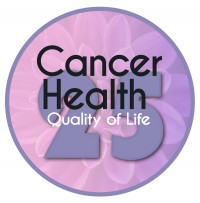The Cancer Health 25 is an annual list that honors individuals who have made a difference in the lives of people with cancer. This year’s theme is quality of life. To see the full list, click here.

Think fast: What is the biggest cancer killer of women? What about of men? For an awareness campaign with the nonprofit Catch It In Time, former NFL linebacker Chris Draft, 46, took to the streets with a camera crew and posed those questions to the unsuspecting public. Most people guessed breast and prostate cancer. Most were wrong. The answer is lung cancer. “Overall,” Draft says, “lung cancer kills more people than breast, prostate, colon, liver, kidney and melanoma cancer combined.” To which everyone expresses surprise. As one woman said, “I don’t understand why there isn’t more awareness around that fact.”
Exactly! Draft aims to change that by promoting lung cancer awareness and screenings.
It’s a personal mission. In 2010, after 12 years in the NFL, Draft retired and prepared to settle down with his longtime sweetheart, Keasha Rutledge. A few months later, she was diagnosed with Stage IV lung cancer. “She was 37 years old, in amazing shape and did not have a smoking history,” Draft told Stand Up To Cancer (SU2C), which raises funds for cancer research. “We learned the most important fact about lung cancer—that anyone can get it.”
Rutledge died in 2011, but not before the two were married and launched the Chris Draft Family Foundation and the Team Draft initiative to raise awareness of lung cancer. One of the most popular Draft programs is the annual Super Bowl Challenge in which lung cancer survivors compete to raise funds for research and awareness; the three top fundraisers score tickets to the NFL Pro Bowl, the Taste of the NFL and, yes, the Super Bowl as well as a personal backstage escort courtesy of Draft. The competition and the participants’ personal stories garner media attention and get the word out about lung cancer.
Draft aims not only to empower families to lead healthy lifestyles but also to change the face of lung cancer through campaigns, collaborations, public speaking and more. “I was honored to be a patient advocate on a Stand Up To Cancer team that pursued the first SU2C Interception Grant for lung cancer (the SU2C–LUNGevity–ALA Lung Cancer Interception Research Team),” he tells Cancer Health. “I also admire SU2C’s efforts to fund research and awareness efforts focused on increasing access to and awareness for lung cancer screening and improving the screening methods. Early detection is a game changer in transforming the survival rate in lung cancer.”







Comments
Comments